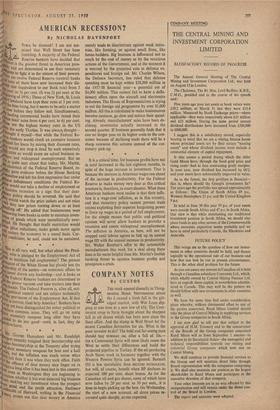AMERICAN RECESSION?
By NICHOLAS DAVENPORT p . ---4`6.-- Reserve bankers have decided that loth Inrie before they follow suit. Simultaneously, e ti*Inle loan' rates from 4 per cent. to 41 per cent. LP ve bankers would check art excessive business i litiei tnand for loans by raising their discount rates, Idlliti,„Y would not stop it dead. by such excessively b` gave evidence before the House Banking inlmq e e business recession as a sign that their dear- Y.3! would watch the price indices and not relax ,obelling off.' He added that businessmen were Ye it conditions, he said, could not be sustained. 1°. : I1.ek are the highest money rates in the US lethought it myself—that while the Federal Re- le SYRIA be damned! I am not sur- 0713unt rate (equivalent to our Bank rate) from 3 ill-lee the early Thirties. It was always, thought- 01 , 614n and widespread unemployment. But no CO rlt,ed. He thought that credit restriction would cif 9 re" chairman of the Federal Reserve Board, re- Il.rtiln rates as would cause an actual business re- 110" A.. .. tumbling. A majority of the Federal lint, ll TitY on is the greatest threat to American pros- 319b tinning of 1956.) Those of New York, St. Louis di- troittee and left the firm impression that under Jci
is
il, and are determined to use their monetary tr7neY policy should be reversed. He said that kttil they saw prices turning down or at least At V, - Would not take a decline of employment or to Rowing from banks in order to maintain inven- i. Ill nine of them have now increased their dis- prles of goods which were unrealistically over- okice price reductions, make goods move again i.kient inflationary conditions the Federal Re- ike is quite sure about that today. Mr. Martin, 1.,4Prins to fight it to the utmost of their powers. c r the time being, but it seems to be only a matter e, leading commercial banks have raised their
restore the economy to a sound basis. Cur- f * a *
i This is all very well, but what about the Presi- ed )f :4t, who is pledged by the Employment Act of P '46 to maintain full employment? The present r'h,'npant of the White House has plainly lost the y adership of the nation—on economic affairs he b n1 ,a ever shown any leadership—and it looks as f v the Federal Reserve bankers are determined to h ,..th-e power vacuum and take matters into their 11 hands. The Federal Reserve is, after all, out- olill 0! political control and not subject technically cow; ,the provisions of the Employment Act. If that crew is correct, God help America! Bankers have e_Fr yet been distinguished for either political or ,'iness common sense. They will go on using :it monetary weapons long after they have 4,ed to do any good—until, in fact, they do Naive harm.
* * * Mt. George Humphrey and Mr. Randolph tgess recently resigned their Secretaryship and
Ider-Secretaryship at the Treasury after trying p tilt their monetary weapons for four and a half 0 Ors, but the inflation was much worse when oierkl-Y left than it was when they took office. Faith I the efficacy of dear money may linger on in 0 nerica long after it has been lost in this country, i it even in Washington they are beginning to 'II r estion whether it has ever deterred big business i 4-ti making any investment when the prospect ki 4 good and the profit attractive. Professor tr ilbrann ih., of Harvard, writing in the Financial vr -.'8, Points out that dear money in America merely tends to discriminate against weak indus- tries, like farming, or against small firms, like house-builders. Big business is influenced not so much by the cost of money as by the vexatious actions of the Government, and at the moment it is worried by the projected cuts in defence ex- penditurei and foreign aid. Mr. Charles Wilson, the Defence Secretary, has ruled that defence spending must be kept within $38,000 million in the 1957-58 financial year—a potential cut of $4,000 million. This cannot fail to have a defla- tionary effect upon the aircraft and electronics industries. The House of Representatives is trying to cut the foreign aid programme by over $1,000 million. All this is calculated to make businessmen become cautious, go slow and reduce their spend- ing. Already, manufacturers' sales have been de- clining; inventories actually increased in the second quarter. If business generally finds that it can no longer pass on its higher costs to the con- sumer because of declining trade there will be a sharp recession this autumn instead of the cus- tomary pick-up.
*
It is a critical time, for business profits have not in total increased in the last eighteen months, in spite of the huge increase in investment. That is because the increase in American wages ran ahead of the increase in productivity. For the Federal Reserve to make money very dear at this critical juncture is, therefore, to court disaster. What these American bankers must realise is that their infla- tion is a wage-cost inflation, as in this country, and that monetary policy cannot prevent trade unions exploiting their superior bargaining power to force tip wages in a period of full employment, for the simple reason that public and political opinion will never allow bankers to provoke a recession and create widespread unemployment. The inflation in America, as here, will not be stopped until labour agrees to link up its annual wage lift with the annual increase in productivity. Mr. Walter Reuther's offer to the automobile manufacturers this week for a deal along these lines is far more helpful than Mr. Martin's foolish banking threat to squeeze business profits and precipitate a crisis.






























 Previous page
Previous page